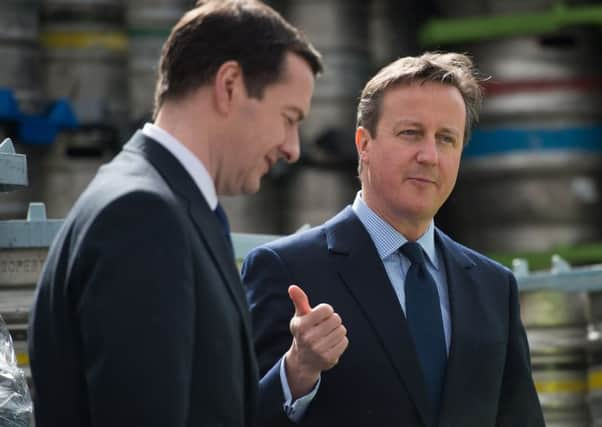Dani Garavelli: Let's call an end to the old pals' act


That his last act as he hummed his way out of power should be to ennoble some of his rich Tory mates was entirely in keeping with a premiership so incestuous half the cabinet went to Oxbridge; so synonymous with establishment cliquishness, the “Chipping Norton set” made it into Brewer’s Dictionary Of Phrase And Fable.
Nor is it exactly unprecedented for prime ministers to take advantage of their position one last time as they head out the door. On the contrary, it is a time-honoured British tradition, dating back at least as far as 1922, when departing PM Lloyd George was accused of raising party funds by charging for titles (from £10,000 for a knighthood to £40,000 for a baronetcy) – a breach that led to the Honours (Prevention of Abuses) Act 1925.
Advertisement
Hide AdAdvertisement
Hide AdThen, of course, there was Harold Wilson’s notorious Lavender List, which included controversial business figures such as Joseph Kagan, Eric Miller and James Goldsmith. The beneficiaries of the Lavender List represented everything the Labour Party was supposed to abhor; Cameron’s list – packed as it is with politicians, spin doctors, aides and Samantha’s stylist – is in perfect harmony with prevailing Tory values.
All the same, it took some chutzpah, didn’t it? To bring back resignation honours when Blair and Brown had eschewed them (Blair because of the cash-for-honours scandal, Brown because he didn’t much approve of them). And after he’d left Theresa May to deal with the consequences of Brexit.
Cameron must have known appointing George Osborne, architect of the government’s austerity programme, Companion of Honour – a title meant to reward “conspicuous service to the nation” – would induce mirth in some quarters and a gag reflex in others. He must have suspected the list would provoke the kind of backlash that resulted in the leak to last week’s Sunday Times and prompted his former strategy guru Steve Hilton to brand it “a symptom of a corrupt and decaying democracy”.
And he must have foreseen the degree of press scrutiny there would be over the presence of top Tory benefactors, such as Andrew Fraser, a former Barings banker, who gave £2.5m to the party and £200,000 to the Better Together campaign.
Not that Fraser is the biggest donor on the list: the top two – James Lupton and Michael Farmer – were also given peerages, while another, Michael Hintz, is to be knighted. A fifth, Michael Spencer, is said to have had his peerage blocked by the honours committee over his involvement with the Libor scandal.
Like the scorpion that stings the frog, Cameron was only acting in accordance with his nature. And he no longer cares what the public thinks. More bizarre was the decision of ultra-principled Jeremy Corbyn to collude in the list by handing a peerage to former Liberty director Shami Chakrabarti, and of the ultra-principled Chakrabarti to accept it. Though she is a worthy candidate, and is doubtless thinking about the opportunity she now has to hold the government to account, the role was always going to impact on public perceptions of her inquiry on anti-Semitism within the Labour Party and bring its independence into question. And, in any case, who would want to be associated with such a shoddy display of patronage?
The entire honours system has been a busted flush for decades. So many of those given gongs went on to be exposed as crooks: Miller committed suicide while accused of fraud; Kagan served time after being convicted of it. Some recipients were at the centre of rumours even before the awards were made: Cyril Smith, for example, and Jimmy Savile. Margaret Thatcher insisted on recognising Savile for his charity work against the express advice of civil servants who felt his behaviour might cause problems later on.
And how often, now, do we hear demands for honours to be rescinded? Kagan, Anthony Blunt and Fred Goodwin were all stripped of knighthoods, while Rolf Harris lost his CBE and Lester Pigott and Stuart Hall their OBEs. (But Savile and Smith could not be stripped of their honours because their titles do not extend beyond death).
Advertisement
Hide AdAdvertisement
Hide AdLast week, Sir Philip Green – the man who destroyed BHS – was branded “the unacceptable face of capitalism” after the work and pensions committee found he extracted huge sums from the store group while leaving its pension fund in deficit. So who decided Green was worthy of a knighthood? Tony Blair, way back in 2006 – three years after the Guardian launched an investigation into his corporate finances and a year before he was accused of using sweat shops.
Some effort has been made to reform the system; to make the process more democratic and inclusive, yet last year the Times newspaper found 46 per cent of those who received honours had gone to public school and 27 per cent to Oxford or Cambridge. Even accepting that 76 per cent of this year’s New Year’s Honours list went to people responsible for important work within their own communities, the whole concept is arbitrary and anachronistic.
Cameron’s tawdry resignation list should act as a catalyst for abolishing, or at least transforming, the honours system, and indeed the House of Lords. Though May refused to veto his decisions, she has in the past called for radical changes to the upper chamber.
Any impulse to tackle this or the honours system, however, is likely to be subordinated to more pressing concerns around Brexit. While this is not ideal, there is one upside. It means there’s still a chance of a knighthood for Andy Murray before time runs out.